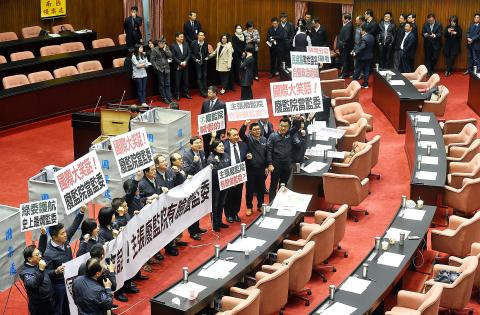All of the Democratic Progressive Party’s (DPP) 11 Control Yuan member nominees were approved by the legislature yesterday in a vote that went along party lines.
Former Judicial Reform Foundation chief executive officer Kao Yung-cheng (高涌誠), former Presidential Office secretary-general Chen Shih-meng (陳師孟), former Taiwan Association for Disability Rights secretary-general Wang Yu-ling (王幼玲), former minister without portfolio Lin Sheng-feng (林盛豐), National Yang Ming University public health professor Peter Chang (張武修), former Taipei Department of Legal Affairs commissioner Yang Fang-ling (楊芳玲), former judge Tsai Chung-yi (蔡崇義), former Taipei Awakening Foundation director-general Yang Fang-wan (楊芳婉) and former DPP legislators Tien Chiu-chin (田秋堇), Walis Perin and Chao Yung-ching (趙永清) all secured at least 70 “yes” votes from the 73 lawmakers who voted.
Walis Perin garnered the most “yes” votes with 73.

Photo: Chu Pei-hsiung, Taipei Times
The Chinese Nationalist Party (KMT) caucus called the approvals “shameless” and an “international joke.”
The DPP used to vilify the Control Yuan, but now that it has the right to nominate its members, the post has suddenly generated renewed interest, KMT caucus secretary-general Lin Wei-chou (林為洲) said.
It is evident from the question-and-answer sessions on Monday and Friday last week that what used to be criticized by the DPP as an obsolete agency and the “appendix” of the constitutional system has enticed nominees, all of whom were eager to assume the post, Lin said.
Chen said that the Control Yuan was “junk,” but that “it can be reused,” Lin said.
“Does a job whose responsibility is to reuse junk justify a monthly salary of NT$190,000?” he asked, referring to the Control Yuan members’ salary.
Lin said the KMT caucus unilaterally agreed that none of the nominees can be justified and KMT lawmakers decided against exercising their right of investiture during the vote.
If President Tsai Ing-wen (蔡英文) is serious about carrying out constitutional reforms, she should have waited until the legislature finished discussing the issue before deciding whether to make nominations, KMT caucus deputy secretary-general Lee Yen-hsiu (李彥秀) said.
Rushing to make nominations only shows that the DPP treats the position of Control Yuan member as a tool for its pork-barrel politics, she said, expressing the concern that the new members might override the judiciary on behalf of the DPP.
KMT Legislator Alicia Wang (王育敏) panned Chen for saying that he would take action against judges who were allegedly biased against members of the pan-green camp — including former president Chen Shui-bian (陳水扁) — while deliberating on cases.
Chen Shih-meng, while being questioned by KMT lawmakers on Monday, said he believed the former president is a victim of judicial persecution.
Chen Shih-meng’s remarks were no different from trampling on the nation’s judiciary, Alicia Wang said, questioning Tsai’s resolve to push for judicial reforms for nominating someone so biased against the judiciary.
The People First Party abstained from voting yesterday, while New Power Party legislators Huang Kuo-chang (黃國昌), Hsu Yung-ming (徐永明), Kawlo Iyun Pacidal and Freddy Lim (林昶佐) voted.
KMT Legislator Chen Chao-ming (陳超明), the only KMT member who cast votes, said he voted only for Walis Perin and not for the rest.
KMT caucus whip Lin Te-fu (林德福) said he would report to KMT headquarters Chen Chao-ming’s defiance of the caucus’ agreement to withdraw from voting, recommending punishments.

‘DENIAL DEFENSE’: The US would increase its military presence with uncrewed ships, and submarines, while boosting defense in the Indo-Pacific, a Pete Hegseth memo said The US is reorienting its military strategy to focus primarily on deterring a potential Chinese invasion of Taiwan, a memo signed by US Secretary of Defense Pete Hegseth showed. The memo also called on Taiwan to increase its defense spending. The document, known as the “Interim National Defense Strategic Guidance,” was distributed this month and detailed the national defense plans of US President Donald Trump’s administration, an article in the Washington Post said on Saturday. It outlines how the US can prepare for a potential war with China and defend itself from threats in the “near abroad,” including Greenland and the Panama

A wild live dugong was found in Taiwan for the first time in 88 years, after it was accidentally caught by a fisher’s net on Tuesday in Yilan County’s Fenniaolin (粉鳥林). This is the first sighting of the species in Taiwan since 1937, having already been considered “extinct” in the country and considered as “vulnerable” by the International Union for Conservation of Nature. A fisher surnamed Chen (陳) went to Fenniaolin to collect the fish in his netting, but instead caught a 3m long, 500kg dugong. The fisher released the animal back into the wild, not realizing it was an endangered species at

The High Prosecutors’ Office yesterday withdrew an appeal against the acquittal of a former bank manager 22 years after his death, marking Taiwan’s first instance of prosecutors rendering posthumous justice to a wrongfully convicted defendant. Chu Ching-en (諸慶恩) — formerly a manager at the Taipei branch of BNP Paribas — was in 1999 accused by Weng Mao-chung (翁茂鍾), then-president of Chia Her Industrial Co, of forging a request for a fixed deposit of US$10 million by I-Hwa Industrial Co, a subsidiary of Chia Her, which was used as collateral. Chu was ruled not guilty in the first trial, but was found guilty

The Chinese Nationalist Party (KMT) is maintaining close ties with Beijing, the Democratic Progressive Party (DPP) said yesterday, hours after a new round of Chinese military drills in the Taiwan Strait began. Political parties in a democracy have a responsibility to be loyal to the nation and defend its sovereignty, DPP spokesman Justin Wu (吳崢) told a news conference in Taipei. His comments came hours after Beijing announced via Chinese state media that the Chinese People’s Liberation Army’s Eastern Theater Command was holding large-scale drills simulating a multi-pronged attack on Taiwan. Contrary to the KMT’s claims that it is staunchly anti-communist, KMT Deputy